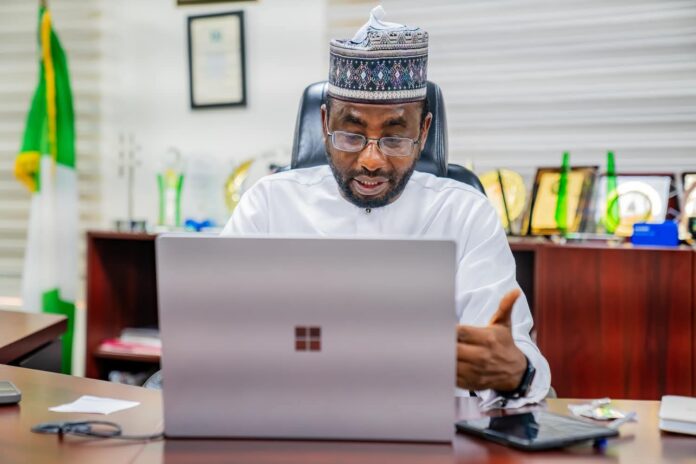The Federal Government is scaling up its digital inclusion efforts to support displaced Nigerians, with new plans to expand access to ICT tools and training in resettlement cities and camps across the country.
The Director-General of the National Information Technology Development Agency, Kashifu Inuwa, made this known during a strategic engagement with the National Commission for Refugees, Migrants, and Internally Displaced Persons, held at NITDA’s Corporate Headquarters in Abuja.
Inuwa, in a disclosure on Saturday, reaffirmed the agency’s commitment to inclusive digital transformation, particularly among Nigeria’s internally displaced population.
He announced that NITDA would “reactivate and scale up” its partnership with the refugee commission by supplying new ICT equipment and introducing tailored digital literacy programmes in resettlement areas.
“This collaboration aligns with our Strategic Roadmap and Action Plan (SRAP 2024–2027), which seeks to achieve 70 per cent digital literacy across Nigeria by 2027,” Inuwa said, describing the initiative as central to the Federal Government’s broader digital economy agenda.
Among the outlined interventions are the establishment of community-based digital learning centres equipped with shared devices, the deployment of trained National Youth Service Corps members to deliver ICT training, and the provision of ICT infrastructure tailored to the unique needs of each community.
Inuwa also disclosed that NITDA is partnering with an international organisation to roll out innovative tech hubs in Internally Displaced Persons camps within the Federal Capital Territory.
He emphasised the need to formalise the collaboration with NCFRMI through a structured workstream to conduct joint needs assessments, design customised interventions, and develop a scalable model for nationwide deployment.
“This is not just about equipment; it’s about creating sustainable access to digital tools that empower people and give them a fair shot at rebuilding their lives,” he said.
Speaking at the meeting, the Federal Commissioner of NCFRMI, Hon. Tijani Aliyu Ahmed, praised NITDA’s leadership in driving inclusive development through technology.
He noted that Nigeria is currently home to over 6.1 million internally displaced persons, largely due to insecurity, insurgency, and natural disasters, with over 125,000 Nigerians seeking refuge in neighbouring countries.
Ahmed said while the Federal Government is actively working to address the crisis, stronger partnerships are needed to truly empower affected populations.
“This partnership goes beyond digital literacy. It is about restoring dignity and creating opportunities for displaced Nigerians,” Ahmed said, adding that the Commission is also focused on strengthening host communities by improving access to clean water, rehabilitated schools, and healthcare services.
He said resettlement cities have already been established in Kano, Borno, Zamfara, Katsina, and Daura, with a new site in Keffi, Nasarawa State, now housing over 40 households.
These centres provide homes, healthcare facilities, markets, schools, vocational training hubs, and agricultural land, enabling displaced families to rebuild with dignity.
“Digital literacy is now a vital component of empowerment. With initiatives like JAMB’s shift to computer-based testing, we must ensure displaced children and youth are not left behind,” Ahmed added.
“We are fully committed to working with NITDA to bridge the digital divide.”
















